I’ve chased this show for years.
“This show” refers to my current project, The Bridges of Madison County, a musical that premiered in 2013 at the Williamstown Theatre Festival as it began its journey to Broadway. I had an audition for the role of Bud, an Iowa farmer whose needs were few and dreams were simple. I didn’t know much about the musical; I had heard of the book and movie adaptation, but never really been exposed to either. Lesson #1: Do some research. Shouldn’t have to say that, right?
It was an unremarkable audition. I sang my own song, nothing from the score which was unknown to me. I read from the script, a scene that if my memory is faithful, hasn’t changed much over the years. I auditioned for the show’s director, the man who would carry this piece to New York City. All told, I might have been in that audition room for five minutes. Another appointment, another audition, just a typical day in the life. I didn’t think much about it.
Unbeknownst to me, that day began this nearly five-year journey, which ends with me in Silicon Valley, California.
As actors, there are roles that call out to us. We read the material, hear the music, attend the play, and we see ourselves in the piece. Sometimes literally, we see ourselves. Maybe that’s egocentric, but I hardly think it’s deniable (any more than you could deny that actors have egos, no matter how well-managed). Here, in the second act of my own career, I long to tell stories. Not to take final bows or win awards, though that was certainly the young performer I was. Now I want to tell stories that mean something, either to me or to the world at large. If I could borrow from another favorite musical Sunday in the Park with George, “I want to make things that count.”
The Bridges of Madison County became one of those stories I was dying to tell. The show was announced for Broadway and premiered at the Gerald Schoenfeld Theatre. I went to another audition, this time a chorus call for the New York production. I still didn’t really know anything about the musical, but I do remember thinking, “Aren’t the ages for these characters all wrong?” My opinions were based on mostly ignorance, only knowing that Clint Eastwood and Meryl Streep, the stars of the film adaptation, were not exactly between 30 and 40 years old. I guess we form attachments to the images we are familiar with. I auditioned and got nowhere. Again, just another day in New York.
The show began it’s run, and a dear friend of mine went to see it and could not stop gushing, not only about the show but particularly about the lead actor playing Robert Kincaid. I trust my friend’s opinion, though we tend to have different musical tastes. But I bought the cast album and was hooked. I was stunned. I had never heard anything like this.
I’ve been deliberately vague about the real-life people involved in this story, not for any reason other than brevity, but here I have to take a moment to write the name Jason Robert Brown. If you are reading this, you probably already know who I’m talking about. I’ve been a fan of his work from the beginning. But as much as I’ve loved The Last Five Years, Songs for a New World, Parade, and practically everything he’s ever created, this latest creation was different. The structure of this score is brilliant, borderline genius. I’ve never encountered a score that was built like this, without taking too deep a dive, the vocal challenge rises as we approach the climax of the story. We all know the phrase, “11 o’clock number,” but this show has “11 o’clock NUMBERS,” and earns each one of them.
Unfortunately, Bridges failed to find a steady audience on Broadway, lasting only 100 performances (sounds like a large number, but Broadway is a tough financial game). My wife and I were in attendance at performance number 97, I believe.
I was amazed. I knew the album but was still dumbstruck. And I immediately coveted the role of Robert Kincaid, the photographer for the National Geographic who had resigned himself to a solitary life but was truly dying for a special human connection. I knew who this man was, because in many ways, I was him. Yes, I’m married and have a family and have been saved from that loneliness, but I see how easily I could have been just like him. There was however, one problem with me ever playing this role…I wasn’t sure I could sing it. Honestly, I was almost sure I couldn’t.
But that story is for later. The next chapter is of course another audition, this time for the National Tour. Another appointment, again for Bud, the husband. Another audition for the original director. And gratefully, a callback…for the understudy. Which is fine, truly. But the problem was that the tour couldn’t pay enough for me to really consider it. (I’ll spare the details, all I will say is that the country was lucky this tour was produced on any level). Lesson #2: when you audition (or apply) for a job, be sure you can manage the salary; otherwise don’t waste anyone’s time. That old saying that actors should audition for everything is nonsense. You should audition for everything that you are remotely right for and can accept if offered. I asked my agent to decline the callback; I simply could not afford the job even if I booked it. That was tough for me, I wanted to be close to this show in any manner possible.
Finally the show is available for regional productions. The appointments start to come in, not many, as theatre programming is a delicate balance of finance and art. But at last I am seen for Robert Kincaid at a small theatre in Connecticut. I have a nice audition but don’t book it. Disappointing but fine. I have developed a new appreciation for auditioning in the last few years, I tend to view auditions as the only potential performing opportunity I may have. And sometimes, that’s enough. Mere weeks later, I have another audition, for Robert, at a very well-respected and established company called Theatreworks, in Palo Alto, California.
The audition material is similar, as often happens. But I remember specifically being surprised at something that was not asked. I wasn’t asked to sing what I consider Robert’s most difficult song, “It All Fades Away.” In truth I was grateful, I wasn’t that confident I could pull it off. That may sound crazy, because if you get hired, you have to do it! I had no doubt I could do it once, but eight times a week? Twice a day? Five times in 50 hours? My wife and I have a saying, “Get the problem before you solve it.” People often try to solve problems they don’t actually have.
I enjoyed the audition. Again, I may never have this job, I have to enjoy this moment. What followed was four or five emails between me and my agent…” still in the running”, “no decisions have been made”, and so on. And eventually, I hear…nothing.
Sometimes actors will ask for feedback when we don’t book a job. I never have. To me, silence, though painful, is feedback. And you have to know for yourself if you did good work. Booking or not booking a job is about a lot more than just doing good work.
So I moved on. Eventually I heard a good friend had booked it (which I kind of figured happened, I saw him at the audition and knew he had at least as good a shot as I, if not a better one). But the universe is full of unexpected turns, and some good news for him turned out to also be good news for me. He was presented a great opportunity elsewhere, and I was offered Robert Kincaid at Theatreworks.
This good news came with a juggling act, rearranging my personal life to accommodate leaving home for two months. I immediately contacted my voice teacher; I knew there was no way I could navigate this on my own. And with his help and the support of a few others, I found a path. It’s not been without a few bumps in the road (my youngest daughter informed me as soon as the show was over, ‘I heard you crack.’ Yes, dear. So did everyone else. It happens sometimes, and the world keeps turning). But overall, I couldn’t be happier with how it’s all turned out.
This production is beautiful—this magnificent script and score has been matched by Theatreworks in design, orchestra, leadership, and company. The cast is wonderful. The crew is wonderful. The city, the weather, the reception, the audiences—all wonderful. This doesn’t happen everywhere; frankly it hardly happens anywhere. Of all the Bridges I’ve chased, I cannot imagine any other comparing. Maybe that’s sentimental, but it doesn’t mean it’s not true.
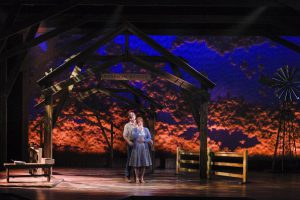
What’s the lesson here for you? There are a few. One, you know when you see a role that calls out to you. Chase it. Learn it. Be ready when it comes your way. Two, when you get there, it may be everything you hoped or it may not. I got lucky, but if you don’t, be the force of good for those around you. And be open, you only know what you know. Someone else may show you a world of ideas.
We close this beautiful experience in less than a week. And as Robert says in the play, “I will be gone. On to the next job. So I know I can’t stay anywhere, regardless of what happens.” And go I will. But this experience will always be with me.

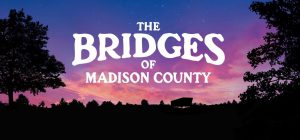


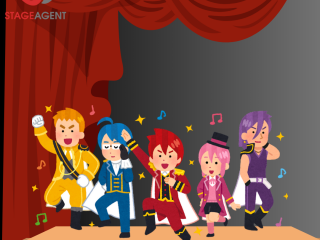


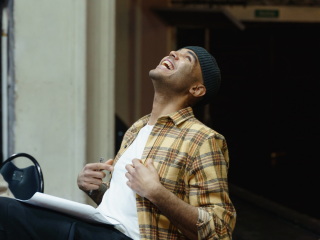
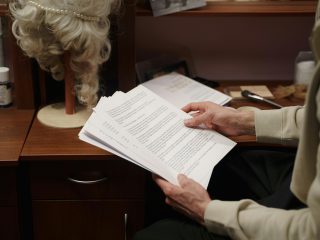
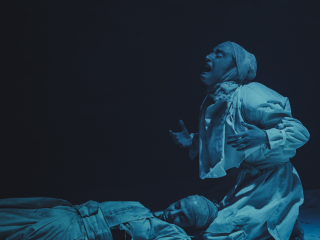






1 comment
Hi Rob!
I enjoyed your Bridges story.
Thank you for sharing,
JM